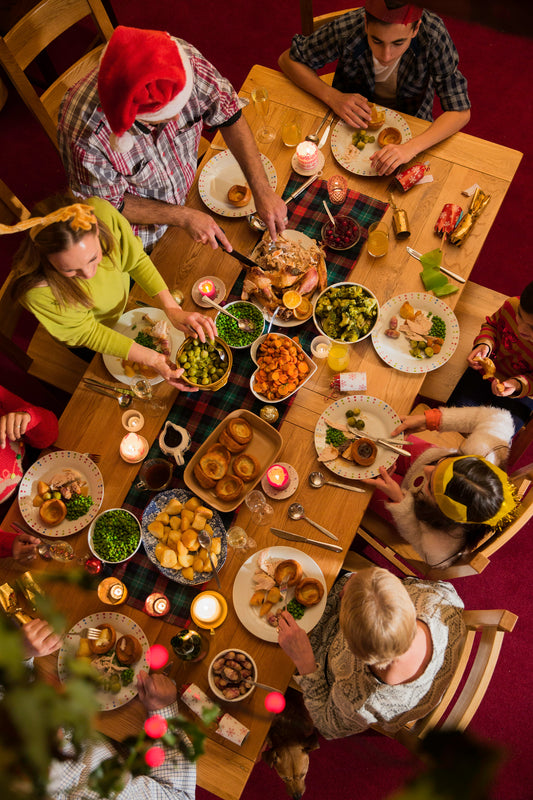Today, we'll be exploring the fascinating history of British cuisine. Now, I know what you might be thinking: "British food? Is that even a thing?" Well, let me tell you, it most certainly is! So, put on your best accent, grab a cup of tea, and let's dive into the evolution of British cuisine.
The Early Days of British Cuisine
To understand the history of British food, we need to go back in time to the days of the ancient Britons. Back then, their diet consisted mostly of wild game, fish, fruits, and vegetables. They also enjoyed mead, a type of fermented honey drink that was popular throughout the Middle Ages. Fast forward a few hundred years, and the Roman invasion of Britain in 43 AD brought with it new culinary influences. The Romans introduced a variety of foods to the Britons, including cherries, plums, peaches, and even snails.
The Middle Ages
In the Middle Ages, the cuisine of Britain began to take on a more distinct identity. The influence of the Church was particularly significant during this time, as religious customs dictated what people could and could not eat. Fridays were considered meatless days, and Lent was a period of fasting and abstinence. As a result, fish became a staple in the British diet, and seafood dishes like fish and chips became popular.
The Tudor Era
The Tudor era brought with it a newfound love for spices and exotic foods. The wealthy aristocracy began to import spices from Asia and the Middle East, and new dishes like curry and pilau rice started to appear on the dining tables of the wealthy. However, the Tudor era also saw the rise of a new trend in British cuisine: the "roast dinner." Roast beef, roast chicken, and roast pork became staples of the British diet, and they remain popular to this day.
The Industrial Revolution
The Industrial Revolution had a significant impact on British cuisine. With the rise of factories and mass production, food became cheaper and more widely available. The working class began to enjoy foods like bread, cheese, and beer, while the wealthy continued to indulge in elaborate feasts. The Victorians, in particular, were known for their extravagant banquets, featuring dishes like roast goose, jellied eels, and beef Wellington.
The World Wars
The World Wars had a profound impact on British cuisine. During World War I, food shortages were common, and the government introduced rationing to ensure that everyone had access to basic provisions. In World War II, rationing was even more strict, with items like butter, sugar, and meat being heavily restricted. As a result, Britons had to get creative with their cooking, using ingredients like powdered egg and Spam to make do.
Post-War Britain
After the war, British cuisine began to experience a revival. The introduction of new ingredients and cooking techniques from around the world led to a more diverse and exciting food scene. The 1960s saw the rise of "modern" British cuisine, with chefs like Fanny Cradock and Elizabeth David introducing new dishes like beef stroganoff and spaghetti Bolognese to British kitchens.
Today's British Cuisine
Today, British cuisine is a melting pot of influences from around the world. Indian curries, Chinese stir-fries, and Italian pastas are all popular dishes in Britain, and traditional British dishes like fish and chips, shepherd's pie, and bangers and mash are still enjoyed by millions. British chefs like Jamie Oliver and Gordon Ramsay have also helped to raise the profile of British cuisine, with their innovative takes on traditional dishe


 Easter 2026
Easter 2026
 Frozen Food
Frozen Food
 Baking
Baking
 Beans, Peas, Soups & Tins
Beans, Peas, Soups & Tins
 Biscuits, Crackers & Cookies
Biscuits, Crackers & Cookies
 Candy / Sweets
Candy / Sweets
 Crisps & Snacks
Crisps & Snacks
 Chemist / Pharmacy
Chemist / Pharmacy
 Desserts
Desserts
 Gravy, Stock & Paste
Gravy, Stock & Paste
 Haggis
Haggis
 Indian Sauces, Paste and Pickle
Indian Sauces, Paste and Pickle
 Jams & Preserves
Jams & Preserves
 Poppy Appeal
Poppy Appeal
 Pot Noodles & Super Noodles
Pot Noodles & Super Noodles
 Scone Mix
Scone Mix
 Gluten-Free / Free From
Gluten-Free / Free From
 Tea Accessories
Tea Accessories
 Teapot & Tea sets
Teapot & Tea sets
 Tea For One
Tea For One
 Sugar & Creamer
Sugar & Creamer
 Tableware
Tableware
 Serveware
Serveware
 Plates & Trays
Plates & Trays
 Bowls
Bowls
 Cups & Saucers
Cups & Saucers
 Mugs
Mugs
 Silverware
Silverware
 Dinnerware - Accessories
Dinnerware - Accessories
 Dinnerware - For Pets
Dinnerware - For Pets
 Victoria Eggs - Hand-Drawn UK Homeware
Victoria Eggs - Hand-Drawn UK Homeware
 Jewelry & Accessories
Jewelry & Accessories
 Sale
Sale
 Christmas Gifts
Christmas Gifts

